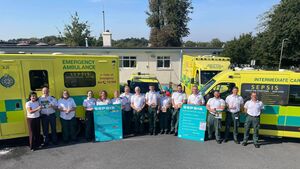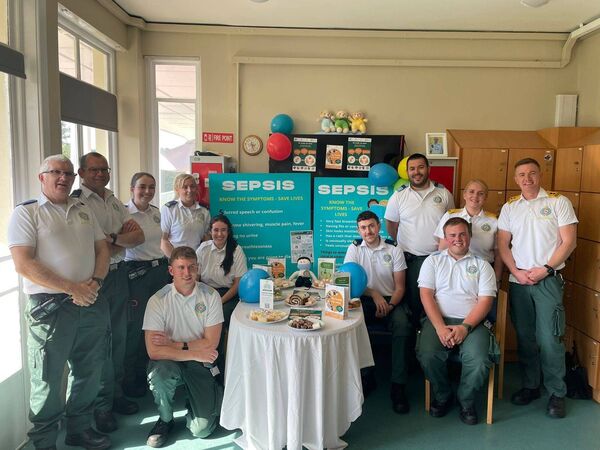Waterford ambulance service promotes sepsis awareness

Members of Waterford Ambulance Service promoting awareness around sepsis
Members of the ambulance service in Waterford City participated in an event recently aimed at highlighting awareness around sepsis.
The event was organised as part of the recent World Patient Safety Day which had an overall theme of 'improving diagnosis for patient safety'.
The Advanced Paramedic Supervisor in Waterford Ambulance Station, Paul Malone, said the ambulance service played a crucial role in supporting World Patient Safety Day by promoting safety, raising awareness and enhancing the quality of emergency care.
Paul said the paramedics and staff in Waterford Ambulance Station marked the day by focusing attention on sepsis.
"This is a serious illness that can affect anyone at any age," said Paul.
According to the HSE National Sepsis Report 2023, there were 15,722 cases of sepsis and Septic Shock in 2023. There were also 2,891 cases in children between 2020 and 2023.
"Quick diagnosis and treatment of Sepsis can make all the difference," said Paul. He also encouraged people not to be afraid to ask and seek advice of help, commenting: "Don’t be afraid to ask could it be sepsis."

Sepsis is life-threatening reaction to an infection and it happens when a person's immune system overreacts to an infection resulting in it starting to damage the person's own tissues and organs.
While sepsis can obviously seriously impact on the very young and elderly, the reality is that it's something that can have very serious health repercussions in people of any age.
Once the immune system overreacts to an infection it can lead to shock, multi-organ failure and even death - especially if not recognised early and treated promptly. It's estimated that around 20 per cent of deaths worldwide are associated with sepsis and while many people survive it there can be severe consequences that will affect them for the rest of their lives.
According to the HSE, while sepsis is regarded as a life-threatening complication of an infection most cases lead to full recovery - if its identified and treated quickly. An infection can trigger sepsis in any part of the body and the most common sites of infection that lead to sepsis are the lungs, urinary tract and tummy.
The HSE advises people to contact their GP immediately if they have any of the following symptoms of an infection: Temperature of 38C or higher; Temperature of under 36C; Severe, uncontrollable shivering; Feeling tired (fatigue); Loss of appetite; Muscle and joint pain; Vomiting or diarrhoea.
There are a number of infections that can be associated with sepsis, however, sometimes the infection and source of sepsis cannot be identified.
For more information on sepsis and actions that can be taken to help prevent infections that can lead to it go to www2.hse.ie






